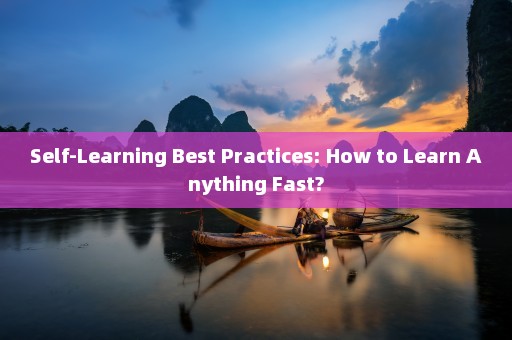It was a typical Monday morning when I found myself facing a daunting challenge. I had to learn a new programming language in just two weeks, or risk falling behind on a crucial project at work. With my heart racing and a mountain of resources in front of me, I knew I needed a strategic approach to tackle this task. Little did I know that this experience would teach me invaluable lessons on self-learning and rapid skill acquisition.

Assess Your Starting Point
Before diving into the sea of information, I took a step back to assess my current knowledge level. Understanding where you stand is crucial because it helps you identify your learning gaps and set realistic goals. In my case, I had some basic programming experience, but the language I needed to learn was vastly different. This assessment allowed me to focus on the core concepts and prioritize my learning.
Set Clear, Achievable Goals
With my starting point established, I set clear, achievable goals for each day. Breaking down the learning process into smaller, manageable chunks helps in maintaining focus and motivation. For instance, my goal for the first two days was to grasp the fundamental syntax and structure of the new programming language. This approach made the learning process less overwhelming and more measurable.
Choose the Right Resources
With an abundance of resources available, it's essential to choose wisely. Iopted for a mix of online tutorials, video courses, and interactive coding exercises. According to a study by the University of California, Irvine, combining different types of resources enhances comprehension and retention. Additionally, I ensured that the resources were reputable and aligned with my learning style.
Stay Organized and Focused
Organization is key to rapid learning. I created a schedule, allocating specific time slots for learning, practicing, and reviewing. This structured approach helped me stay on track and avoid wasting time on unnecessary information. Moreover, I practiced mindfulness during my study sessions, eliminating distractions and maintaining focus. A study by the Journal of Applied Psychology suggests that mindfulness can improve cognitive functioning and learning.
Apply the Knowledge Through Active Learning
One of the most effective ways to learn quickly is through active learning. Instead of passively consuming information, I applied what I learned by writing code and working on small projects. This practical approach reinforced my understanding and helped me identify areas that needed improvement. Research by the National Training Laboratories in Bethel, Maine, indicates that active learning can increase retention rates by up to 90%.
Seek Feedback and Adjust Your Approach
Regularly seeking feedback is crucial for rapid learning. I shared my progress with colleagues and mentors, who provided constructive criticism and guidance. This feedback helped me identify my weaknesses and adjust my learning strategy accordingly. Remember, the ability to adapt and learn from others is a sign of a successful self-learner.
Conclusion
Looking back, those two weeks were a whirlwind of learning and growth. By following these best practices, I not only mastered the new programming language but also developed a framework for rapid self-learning. Whether you're facing a tight deadline or simply want to acquire a new skill, applying these strategies can help you learn anything fast. So, embrace the challenge, stay focused, and enjoy the journey of self-discovery and growth.
Post a comment

Comment List